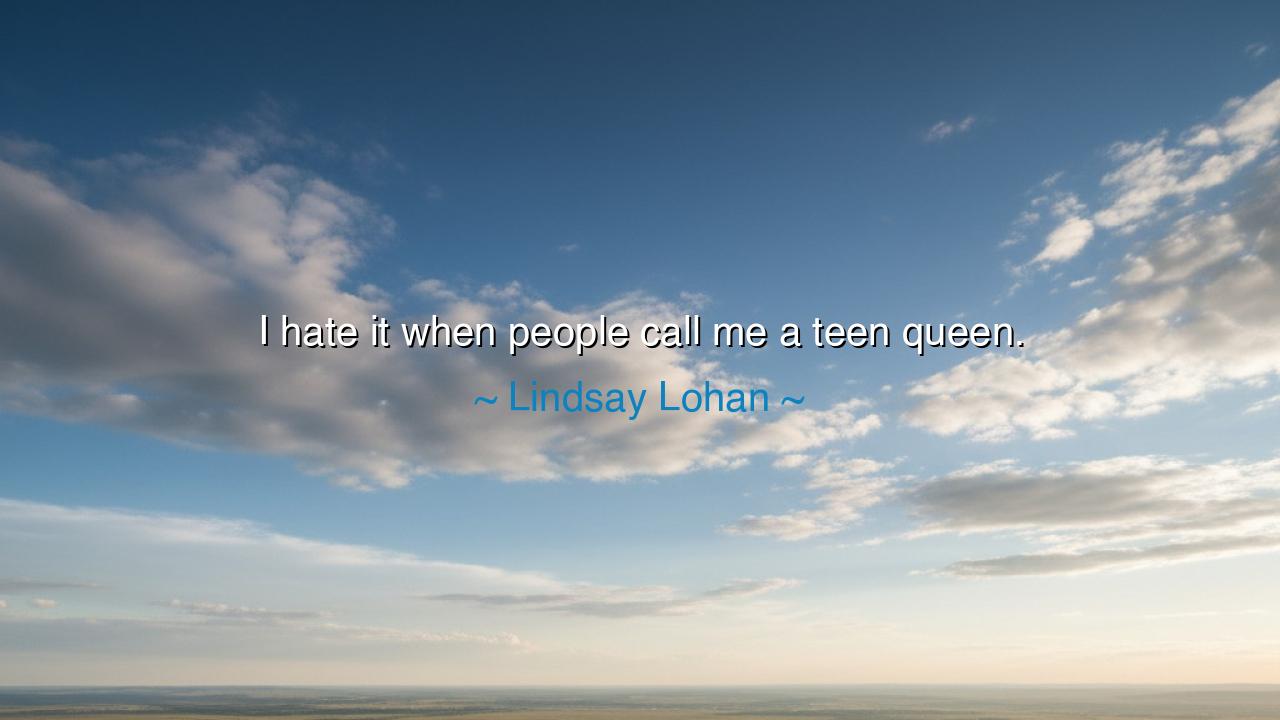
I hate it when people call me a teen queen.






Lindsay Lohan once declared with fiery honesty: "I hate it when people call me a teen queen." Within this brief cry lies the anguish of being confined, the resistance of a spirit unwilling to be reduced to a shallow title. To be called a teen queen may sound like flattery, yet for Lohan it was a crown of thorns, a phrase that stripped away depth, maturity, and individuality, reducing her artistry to mere image. Her rejection of this label is not vanity but the yearning of an artist to be seen as more than a symbol, to be recognized for her soul rather than her youth.
The origin of these words is found in the years of Lohan’s meteoric rise in the early 2000s. With films like Freaky Friday and Mean Girls, she became a cultural icon, adored by millions of teenagers and hailed by the press as the reigning figure of youth culture. Yet behind the adoration lay a trap. The title “teen queen” locked her in the cage of adolescence, denying her growth, refusing her the right to evolve as a woman and an actress. Her protest was the protest of many young stars before her—those who tasted the sweetness of fame, only to realize it was also a prison.
History has seen countless figures trapped by titles. Consider Mary Shelley, forever remembered as the “girl who wrote Frankenstein,” though her intellect and writings extended far beyond that one tale. Or Shirley Temple, once celebrated as the golden child of Hollywood, who struggled in later years to be seen as more than the curly-haired starlet of her youth. In each case, the world’s desire to enshrine someone in a single role denied them their full humanity. Lohan’s rejection of the title “teen queen” echoes this ancient struggle—the struggle against being defined by others.
Her words also reveal the deeper pain of identity and autonomy. To be labeled is to be controlled, to have one’s narrative dictated from outside. For a young actress, the phrase may carry not only limitation but exploitation, a reminder that the world values her for what she represents to others, not for who she truly is. Lohan’s anger is thus the anger of a human soul demanding recognition beyond appearance, beyond age, beyond the shallow gaze of celebrity culture.
At the heart of her rejection is the universal truth that we all yearn to be known in fullness. None of us wish to be reduced to a label, no matter how flattering it sounds. For labels are prisons, and even crowns can weigh heavy when they are not freely chosen. Lohan’s protest is therefore not merely personal—it is the voice of every soul who has felt misunderstood, categorized, or diminished by a world unwilling to see their complexity.
The lesson for us is timeless: do not let others define you. Praise and insult alike can become chains if they bind you to an image that is not your own. Seek instead to define yourself, to live with authenticity, and to shed the labels that restrict your growth. If the world calls you something that feels untrue, have the courage to cast it aside. For only you can decide who you are, and only you can walk the path toward your fullest becoming.
Therefore, children of tomorrow, hear Lindsay Lohan’s cry. Do not allow the world to crown you with names that diminish your spirit. Wear no title that does not honor the truth of your being. You are more than an idol, more than an image, more than what others say you are. You are vast, infinite in possibility, and your worth cannot be captured by a single phrase. Reject the false crown, and instead build your own throne of authenticity, forged in the fire of self-knowledge and truth.






AAdministratorAdministrator
Welcome, honored guests. Please leave a comment, we will respond soon